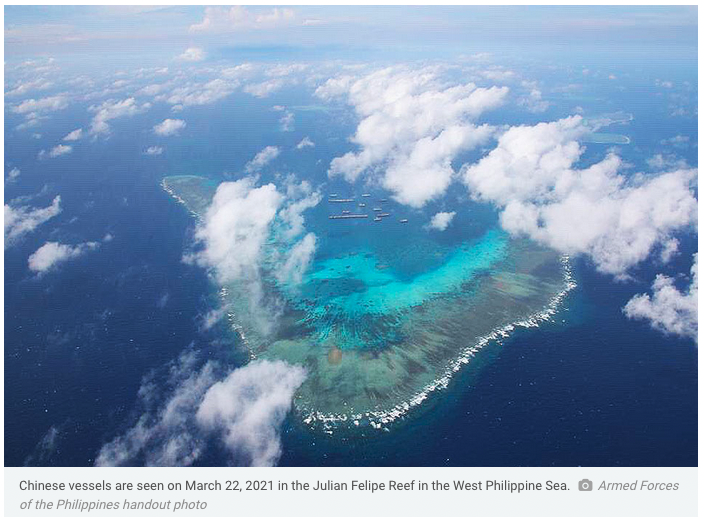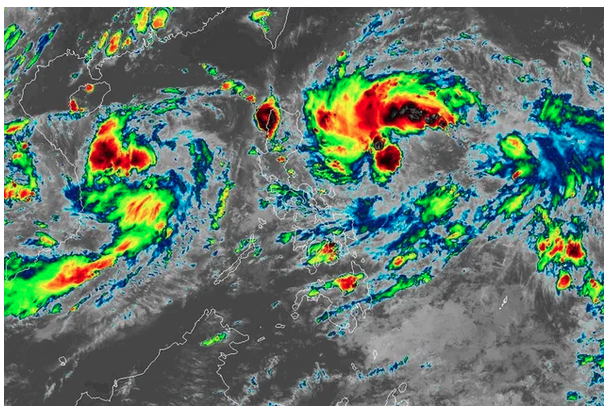Retired Senior Associate Justice Antonio Carpio on Saturday said China does not need to recognize the Hague ruling that upheld the Philippines' rights over the West Philippine Sea for Manila to enforce its sovereignty in the area.
“To exert or enforce the arbitral award, the Philippines does not need the consent of China. The arbitral award by itself affirms the PH can exclusively exploit the national resource in the EEZ without interference from other coastal states,” Carpio said in the 9th Virtual International Conference on South China Sea titled “ Six Years After Tribunal Award: Developments in the South China (West Philippine) Sea”
"For Philippine officials to say the country cannot exploit the oil and gas in EEZ unless China recognizes the arbitrary award is to baselessly grant China a veto power over exploitation of PH EEZ in the WPS," Carpio said. "No country in the world exercises such veto power."
Carpio said that China will never uphold the award, thus waiting for their recognition moot.
“China calls the award just a piece of paper since they consider it null and void since they did not participate in the arbitration but position of China has been debunked by the tribunal,” he explained.
Carpio, however, pointed out that several past and present Philippine government official, “parroted the Chinese propaganda” that the historic ruling is “just a piece of paper.”
“Prior to the arbitral award there was a legal question who owned the natural resources, including the oil and gas in the west Philippine sea, enclosed by china’s 9 dash line— The award provides that final and definitive legal clarity,” he said.
He continued: “Now service contractor knows if it extracts has for China in WPS, the Philippines can sue the contractor for stealing oil and gas belonging to the Philippines.”
Carpio said that a “growing number of coastal states worldwide have invoked the arbitral award.”
“The arbitral award is used to debunk China’s 9-dash line, it is the most definitive and authoritative document declaring China’s 9 dash line has no basis in fact and in law due to the arbitral award the 9 dash line has been ridiculed by scholars all over the world as a gigantic fraud in the international community,” he stressed.
“This coastal states whose EEZ are encroached asserted their sovereign rights despite threats of war and harassment from China,” he added.
Carpio pointed out that in contrast to the Philippines, Malaysia and Indonesia were “able to assert their rights successfully even without an arbitral award or a mutual defense treaty with a nuclear armed state.”
For instance, Carpio shared that on 2021, Indonesia sent its ship to drill test wells in its EEZ off the coast of Natuna Islands facing South China Sea.
China, claiming the area falls under the 9-dash line claim, told Indonesia to halt its operation. The latter, Carpio said, however, persisted, resulting in a months-long stand-off.
“The Indonesians declaring they have sovereign rights proceeded and completed the drilling. China failed to stop them.”
According to Carpio, Malaysia succeeded in a similar situation more than once.
“Malaysia sent its patron as commission service ship West Capella to explore in its EEZ the coast of Borneo, an area falling in 9-dash line. China warned Malaysia not to proceed the exploitation, Chinese CG vessels shadowed the West Capella but Malaysian coastguards and Navy ships accompanied and protected it until it completed its exploration,” he shared.
“Interestingly, 3 US warships and an Australian brigade conducted military drills in the area to lend moral support. Even without an arbitral award and without defense treaty without l nuclear power asserted successfully in its EEZ despite threats and bullying,” he added.
Claudio Valdivia, a management assistant for an international organization, argued that while the award is vital, it is “not enough."
“Sovereignty is being contested by power,” he said. “The conclusion might be is, the only way is to be able to join efforts and present a single statement.”
“If these countries do not receive help from the nations it might be difficult to protect rights in land and sea. The situation is dangerous. Depending on the support these countries receive from other powerful nation, they will be able to defend their rights or they will be as it happened in Europe they might be progressively damaged not only in their infrastructure but narrative as a country.”
According to retired US Navy Captain Carl O. Shuster, a defense consultant and professor, while the Philippines slept on the landmark ruling that struck down China's 9-dash line claim in the last six years, China has not only become aggressive but powerful as well.
“China's navy is the world's largest in terms of numbers of ships and is continuing to grow. It as China has built more warships over the last five years than the United States and all of its allies combined.,” he said.
But apart from increasing in size, the quality of Beijing's navy also grew.
“You're looking at a navy that's growing in size, in quality. It’s the biggest military build-up since World War II. They're expanding their operations, and their construction exceeds that of the United States and all of its allies,” he explained.
He added: “The complexity of their naval operations is also improving and increasing as to the level of activity so you're looking at a broad range of expansion in all levels by the Chinese military.”
Full story here: https://tinylinkurl.com/Kvreh







Comments
Authentication required
You must log in to post a comment.
Log in